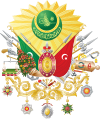Hayriye Hanımsultan
| Hayriye Hanımsultan | |||||
|---|---|---|---|---|---|
 | |||||
| Born | June 1846 Constantinople, Ottoman Empire (present-day Istanbul, Turkey) | ||||
| Died | 26 July 1869 (aged 22–23) Constantinople, Ottoman Empire | ||||
| Burial | Damat Mehmed Ali Pasha Mausoleum, Eyüp, Istanbul | ||||
| Spouse |
Ali Rıza Bey (m. 1866) | ||||
| Issue | Two sons A daughter | ||||
| |||||
| Father | Damat Mehmed Ali Pasha | ||||
| Mother | Adile Sultan | ||||
| Religion | Sunni Islam | ||||
Hayriye Hanımsultan (Ottoman Turkish: خیریه خانم سلطان; "bless" or "lucky"; June 1846 – 26 July 1869) was an Ottoman princess, the daughter of Adile Sultan and Damat Mehmed Ali Pasha.
Biography
[edit]Hayriye Hanımsultan was born in June 1846.[1] Her father was Damat Mehmed Ali Pasha, son of Elhac Ömer Agha,[2] and her mother was Adile Sultan, daughter of Sultan Mahmud II and Zernigâr Hanım.[3] She had three full siblings, Sultanzade Ismail Bey, Şadıka Hanımsultan, Aliye Hanımsultan, of whom all died in infancy.[4][5][6] She had an older half-brother, Mahmud Edhem Pasha, who married Sultan Abdulmejid I's daughter, Refia Sultan,[1] and an older half-sister, Hatice Hanım.[7] She took her piano lessons from Turkish composer, poet and writer Leyla Saz.[8]
On 10 June 1865,[9] she was betrothed to Ahmed Rıfat Bey, son of Mehmed Kani Pasha.[10] However, six months later the engagement was broken off. According to one source, Kani Pasha, who was known for his arrogance, didn't wanted to present an expensive gift to the princess.[9] According to another source, she was in love with Ali Rıza Bey, son of İşkodralı Mustafa Şerif Pasha.[9] After the engagement was broken off, Ahmed Rıfat Bey's military service was terminated. He was then sent to Saint Petersburg.[9]
On 17 April 1866, she married Ali Rıza Bey.[11] The wedding took place on 22 April 1866 in the Kuruçeşme Palace.[12] The couple were given a villa in Çamlıca as their residence.[13] She had two sons and a daughter, but all died in infancy, and several miscarriages.[14] After her father's death in 1868, she built a convent (tekke) near his mausoleum in Eyüp.[15]
She died of tuberculosis on 26 July 1869, and was buried in the mausoleum of her father.[7][9]
Ancestry
[edit]| Ancestors of Hayriye Hanımsultan | |||||||||||||||||||||||||||||||||||||||||||||||||||||||||||||||||||||||||||||||||||||||||||||||||||||||||||||||||||||||||||||||||||||||||||||||||||||||||||||||||||||||||||||||||||||||||||||||||||||||||||||||||||||||||||||||||||||||||||||||||||||||||||||||||||||||||
|---|---|---|---|---|---|---|---|---|---|---|---|---|---|---|---|---|---|---|---|---|---|---|---|---|---|---|---|---|---|---|---|---|---|---|---|---|---|---|---|---|---|---|---|---|---|---|---|---|---|---|---|---|---|---|---|---|---|---|---|---|---|---|---|---|---|---|---|---|---|---|---|---|---|---|---|---|---|---|---|---|---|---|---|---|---|---|---|---|---|---|---|---|---|---|---|---|---|---|---|---|---|---|---|---|---|---|---|---|---|---|---|---|---|---|---|---|---|---|---|---|---|---|---|---|---|---|---|---|---|---|---|---|---|---|---|---|---|---|---|---|---|---|---|---|---|---|---|---|---|---|---|---|---|---|---|---|---|---|---|---|---|---|---|---|---|---|---|---|---|---|---|---|---|---|---|---|---|---|---|---|---|---|---|---|---|---|---|---|---|---|---|---|---|---|---|---|---|---|---|---|---|---|---|---|---|---|---|---|---|---|---|---|---|---|---|---|---|---|---|---|---|---|---|---|---|---|---|---|---|---|---|---|---|---|---|---|---|---|---|---|---|---|---|---|---|---|---|---|---|---|---|---|---|---|---|---|---|---|---|---|---|---|---|---|---|
| |||||||||||||||||||||||||||||||||||||||||||||||||||||||||||||||||||||||||||||||||||||||||||||||||||||||||||||||||||||||||||||||||||||||||||||||||||||||||||||||||||||||||||||||||||||||||||||||||||||||||||||||||||||||||||||||||||||||||||||||||||||||||||||||||||||||||
References
[edit]- ^ a b Sunay 2015, p. 30.
- ^ a b c d Sunay 2015, p. 24.
- ^ a b c d Sunay 2015, p. 32.
- ^ Sunay 2015, pp. 30–31.
- ^ Kolay, Arif (2017-10-15). "Hayırsever, Dindar, Nazik ve Şâire Bir Padişah Kızı: Âdile Sultan". Akademik İncelemeler Dergisi. 12 (2): 1–33. doi:10.17550/akademikincelemeler.306917.
- ^ Dağdelen, İrfan; Türkmen, Hüseyin (2019). Âsâr-ı bakiyye: Nail Bayraktar. Hiperlink eğit.ilet.yay.san.tic.ve ltd.sti. p. 27. ISBN 978-605-281-258-7.
- ^ a b Sunay 2015, p. 31.
- ^ Akyıldız, A. (1998). Mümin ve müsrif bir padişah kızı Refia Sultan. Tarih Vakfı yurt yayınları. Türkiye Ekonomik ve Toplumsal Tarih Vakfı. p. 26. ISBN 978-975-333-081-7.
- ^ a b c d e "Hayriye Hanım Sultan". eyupsultan.bel.tr. 2021-11-21. Retrieved 2022-03-12.
- ^ Rıza, Ali; Çoruk, Ali Şükrü (2001). Eski zamanlarda İstanbul hayatı. Eski zamanlarda İstanbul hayatı. Kitabevi. p. 312. ISBN 978-975-7321-33-0.
- ^ İkinci Eyüpsultan Sempozyumu. Eyüpsultan Belediyesi kültür yayınları. Eyüp Belediyesi. 1998. p. 211.
- ^ Sunay 2015, p. 392.
- ^ "Dünyadan Bir Âdile Sultan Geçti..." www.erkembugraekinci.com. 12 April 2011. Retrieved 12 March 2022.
- ^ Sunay 2015, p. 39 n. 96.
- ^ Simonian, Hovann (January 24, 2007). The Hemshin: History, Society and Identity in the Highlands of Northeast Turkey. Routledge. pp. 103–104. ISBN 978-1-135-79829-1.
- ^ Sunay 2015, p. 25.
- ^ a b Brookes, Douglas Scott (2010). The Concubine, the Princess, and the Teacher: Voices from the Ottoman Harem. University of Texas Press. p. 283. ISBN 978-0-292-78335-5.
Sources
[edit]- Sunay, Serap (2015). Damat Mehmed Ali Paşa'nın Hayatı ve Siyasi Mücadelesi (1813-1868) (PhD Thesis) (in Turkish). Afyon Kocatepe University Institute of Social Sciences.

